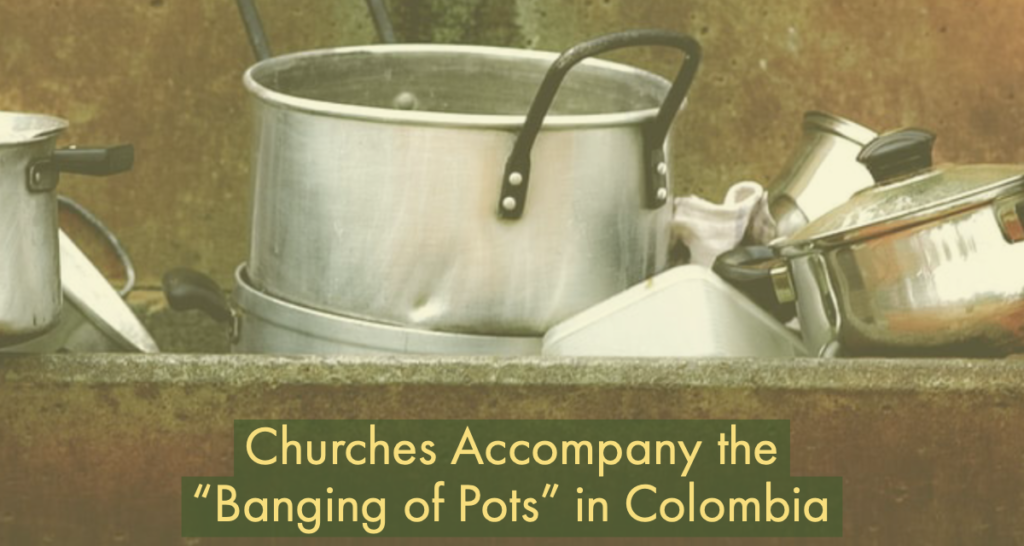Churches Accompany the “Banging of Pots” in Colombia
Click here for letter in Spanish
The Central Workers’ Union of Colombia (CUT) called to continue on Monday the protests against right-wing President Ivan Duque and his neoliberal policies and in defense of peace in the South American nation. The protests began on November 21st and they are ongoing as of this writing. “Many sectors of the population continue to demonstrate through the extraordinary cacerolazos (banging of pots, a form of popular protest which consists of a group of people making noise by banging pots, pans, and other utensils to call for attention. The word cacerolazo comes from the banging of a cacerola, which, in Spanish, means “stewpot“), vigils, sit-ins, and other creative and peaceful ways of protesting, which we strongly support and invite others to join,” the CUT said in a statement. Opposition congressional representatives and Human Rights organizations submitted an urgent request to the Inter-American Commission on Human Rights to investigate what they call “violent acts and arbitrary detentions,” “stigmatization and criminalization” of the protest, “illegal raids” and “incitement to panic” by the government. Dilan Cruz, a Colombian teenager who took part in a protest march to demand better access to education has died, two days after he was hit on the head by a projectile fired by riot police. The death of Dilan Cruz has caused outrage and sparked fresh marches by protesters denouncing what they said was a heavy-handed police response.
You can read reports of the general strike and the continuation of protests here:
https://www.bbc.com/news/world-latin-america-50557496
A vast group of churches and ecumenical institutions in Colombia expressed support of the peaceful expression of the Colombian people in the streets. In a signed declaration sent on November 25, 2019, the churches called for peace, life, and inclusive social justice. They described the citizen mobilizations as “historic, massive, creative, peaceful, and diverse.” They also referred to the way religious communities have been walking in the marches and the cacerolazos accompanying people on their claims for substantive changes to the current government and a hearing of this growing clamor of the citizenship. The churches are aware of and support specific demands to stop a series of reforms (grouped as “el paquetazo” or “the big pack”) that deny historically acquired economic and social rights, has demand respect for the life of leaders and social leaders, and manifests peacefully, rejecting vandalism and damage to public goods. Churches and ecumenical institutions reject the abusive use of ESMAD (acronym in Spanish for the “Mobile Anti-Disturbances Squadron”) police and other law enforcement authorities, affecting girls, children, youth, women, and older adults.
At the closing part of the declaration, Colombian churches and ecumenical institutions said that “As believers in the God of life, in the God who suffers from the one who suffers injustice, God has expressed in those voices that we demand our rights, among them, the fundamental right of peace with justice. This is a key moment for Colombia and we pray to God to face the soul he loves death, we pray that we all make decisions based on love and not in hatred, in a real intention to change public policies and regressive measures that they are detrimental to social achievements, human rights, peace and democracy, and the environment.”
The Mennonite Center for Justice, Peace and Nonviolent Action (JUSTAPAZ), a Global Ministries longstanding Partner in Colombia, is one of the signatories of the declaration.
Click here for letter in Spanish

